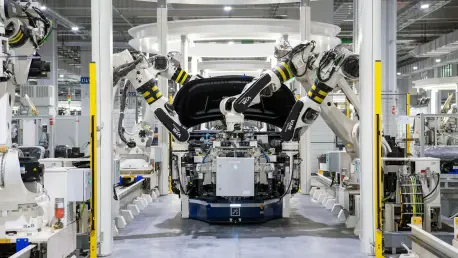Imagine a sprawling aerospace manufacturing facility where every technician, machine, and vehicle operates in perfect sync, driven by a network so powerful that delays and disconnections are virtually nonexistent. This is the reality at Airbus’ Hamburg facility in Germany, where a groundbreaking partnership with a leading telecommunications provider has introduced a private 5G network, transforming the way aircraft are built. The integration of this cutting-edge technology into the safety-critical and precision-driven aerospace industry marks a significant shift, promising not only enhanced efficiency but also a blueprint for the future of smart factories. As digitalization becomes a cornerstone of industrial operations, this collaboration showcases how high-speed, reliable connectivity can address long-standing challenges in vast manufacturing environments, setting a new standard for innovation across sectors.
Transforming Industrial Processes with 5G
Enhancing Connectivity for Technicians and Tools
At the heart of Airbus’ smart factory transformation lies the seamless connectivity provided by the private 5G network, fundamentally changing how technicians interact with complex assembly processes. In the massive hangars of Hamburg, workers now rely on augmented reality glasses to visualize intricate details of aircraft components, confident that the ultra-reliable network will maintain a stable connection. This technology eliminates the frustration of dropped signals, allowing for real-time guidance during critical tasks. Beyond personal tools, smart devices used in assembly instantly transmit data such as torque measurements to centralized systems, ensuring that every step of production is digitally recorded with precision. This level of integration not only boosts individual productivity but also creates a cohesive workflow where errors are minimized, and accountability is enhanced through accurate, accessible records.
The impact of this connectivity extends to the broader operational ecosystem within the factory, redefining efficiency on a larger scale. Collaborative robots, once tethered to fixed data ports, now operate with newfound flexibility thanks to the wireless 5G infrastructure. These machines can be reassigned to different tasks across the facility without the need for physical rewiring, adapting swiftly to production demands. This adaptability is crucial in an industry where customization and rapid response to design changes are often required. Additionally, the network’s ability to connect people, machines, and vehicles across vast industrial spaces addresses a persistent challenge in aerospace manufacturing, creating a synchronized environment. The result is a smarter, faster production line where downtime is reduced, and resources are utilized more effectively, paving the way for scalability in future expansions.
Bridging Aerospace and Telecommunications Expertise
The successful deployment of 5G at Airbus’ Hamburg facility is a testament to the power of cross-industry collaboration, merging the distinct worlds of aerospace and telecommunications into a unified vision. Bridging cultural and operational differences between these sectors was no small feat, yet the partnership achieved a robust and rapidly deployable network that exceeded expectations for speed of implementation. The private 5G platform provided a tailored solution that met the stringent safety and reliability standards of aircraft manufacturing, proving that such technology can thrive in demanding industrial settings. Statements from industry representatives underscore the network’s role in accelerating digitalization initiatives, from 3D simulations to augmented reality applications, positioning this project as a model for other manufacturers seeking to modernize.
Beyond the immediate success in Hamburg, this collaboration highlights a growing trend of leveraging private 5G networks to transform industrial environments with ultra-reliable connectivity. The scalability of the solution is a key advantage, as demonstrated by plans to replicate this model in other Airbus facilities, such as Toulouse in France. Experts involved in the project emphasize the goal of migrating all industrial networks to 5G, ensuring consistent connectivity from workstations to aircraft cabins. This ambition reflects a strategic push toward standardization, which could streamline operations globally. Furthermore, the alliance sets a benchmark for secure, large-scale connectivity solutions, offering insights into how industries can adapt cutting-edge technology to meet specific operational needs while fostering innovation through shared expertise.
Future Horizons for Smart Manufacturing
Global Expansion and Standardization Goals
Looking ahead, Airbus aims to extend the benefits of private 5G networks across its global operations, with plans to standardize this technology in facilities in Spain, the UK, and North America over the coming years. The vision is to create a unified industrial network that ensures consistent performance, whether in a bustling factory or inside an aircraft cabin under assembly. This approach addresses the fragmented nature of current industrial connectivity, where varying systems often hinder efficiency. By establishing a cohesive 5G framework, Airbus seeks to enhance parts traceability, predictive maintenance, and overall operational transparency on an international scale. Such standardization not only promises to optimize manufacturing processes but also positions the company as a leader in adopting transformative technologies across diverse geographies.
The Hamburg facility serves as a compelling proof of concept for this global ambition, demonstrating that even in the expansive and complex environment of aerospace manufacturing, 5G can be implemented effectively. The rapid rollout in Germany suggests that future expansions could follow a similar trajectory, minimizing delays and maximizing impact. Industry insights point to the broader implications of this initiative, suggesting that manufacturers of varying sizes could adopt similar networks to modernize their operations. The scalability and reliability of 5G make it a viable solution for overcoming traditional industrial challenges, from data bottlenecks to connectivity gaps. As Airbus moves toward this unified network model, the lessons learned from initial deployments will likely refine the process, ensuring smoother transitions and fostering a culture of continuous improvement in smart manufacturing.
Pioneering Next-Generation Innovations
The partnership behind Airbus’ 5G transformation is not content to rest on current achievements; instead, it functions as a dynamic laboratory for exploring the future of manufacturing. Already, discussions are underway about integrating next-generation advancements, such as fully connected aircraft cabins designed to enhance passenger experiences through seamless digital services. Additionally, the potential of emerging technologies like 6G and satellite networks is being considered to link remote operations, ensuring connectivity in even the most isolated environments. This forward-thinking mindset reflects a broader industry trend toward relentless innovation, where the adoption of cutting-edge solutions is seen as essential to meeting evolving demands and maintaining a competitive edge.
This commitment to pushing boundaries also involves refining existing applications of 5G to unlock further efficiencies within smart factories. For instance, enhancing real-time data analytics could lead to even more precise predictive maintenance, reducing unexpected downtime and extending the lifespan of critical equipment. The collaborative spirit of this project encourages ongoing experimentation, with both aerospace and telecommunications experts contributing to a shared vision of industrial excellence. As these innovations take shape, they promise to redefine not just how aircraft are built, but how entire industries approach connectivity and digital integration. The groundwork laid today in Hamburg and beyond will likely influence manufacturing paradigms for years to come, illustrating the transformative power of strategic technological partnerships.
Reflecting on a Digital Legacy
Reflecting on the strides made through Airbus’ adoption of private 5G networks, it’s evident that this initiative has carved a path for smarter, more connected industrial operations. The deployment in Hamburg stands as a landmark achievement, proving that high-speed, reliable connectivity can thrive in the challenging landscape of aerospace manufacturing. Plans for global expansion and the exploration of future technologies like 6G underscore a commitment to innovation that goes beyond immediate gains. As a result, Airbus not only enhanced its production efficiency but also crafted a scalable model that other industries can emulate. Moving forward, the focus should remain on refining these networks to support emerging needs, ensuring that adaptability remains at the core of smart factory evolution. This legacy of digital transformation offers a clear vision for tackling industrial challenges with modern solutions, inspiring a future where connectivity drives progress across every sector.









